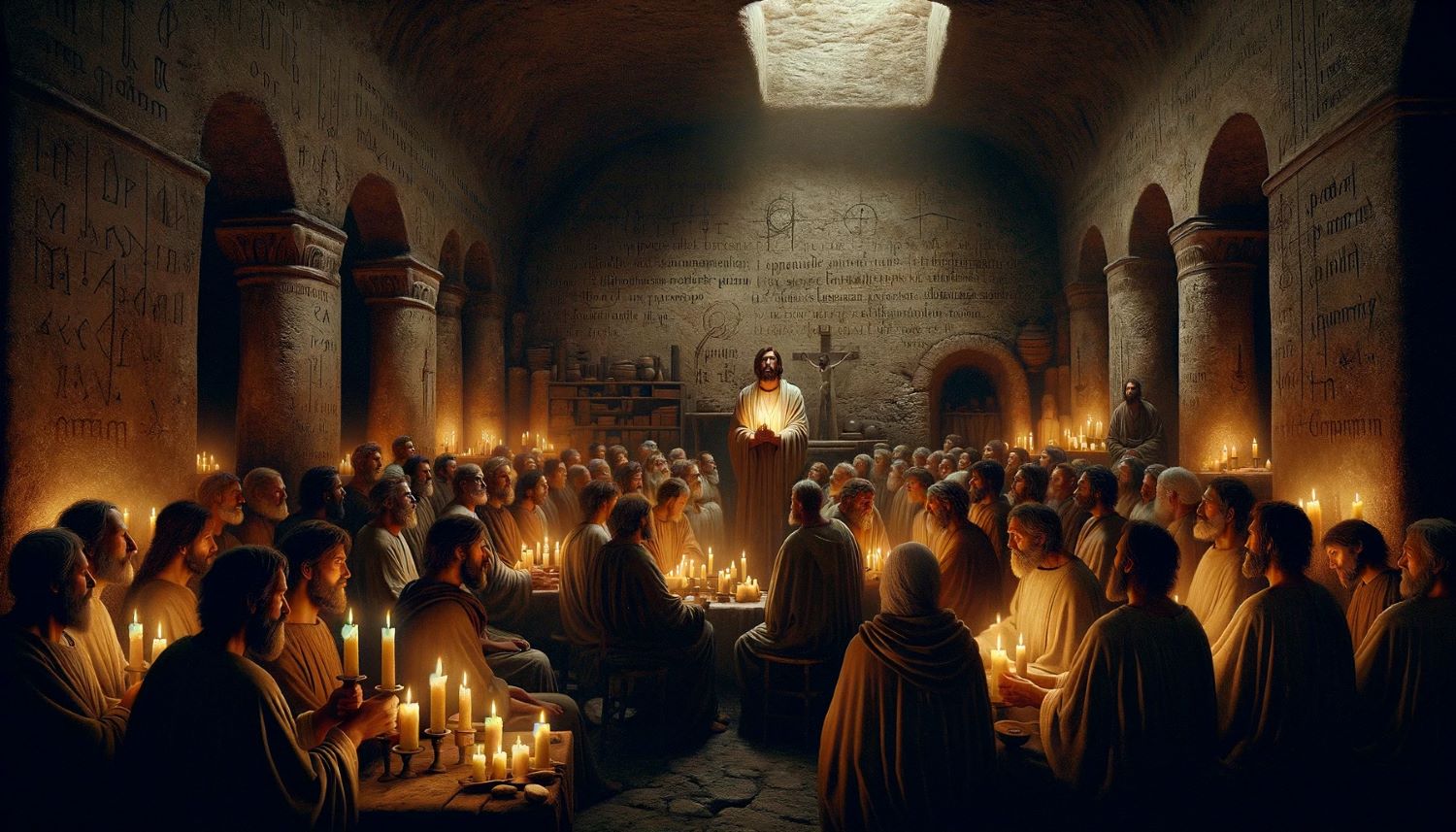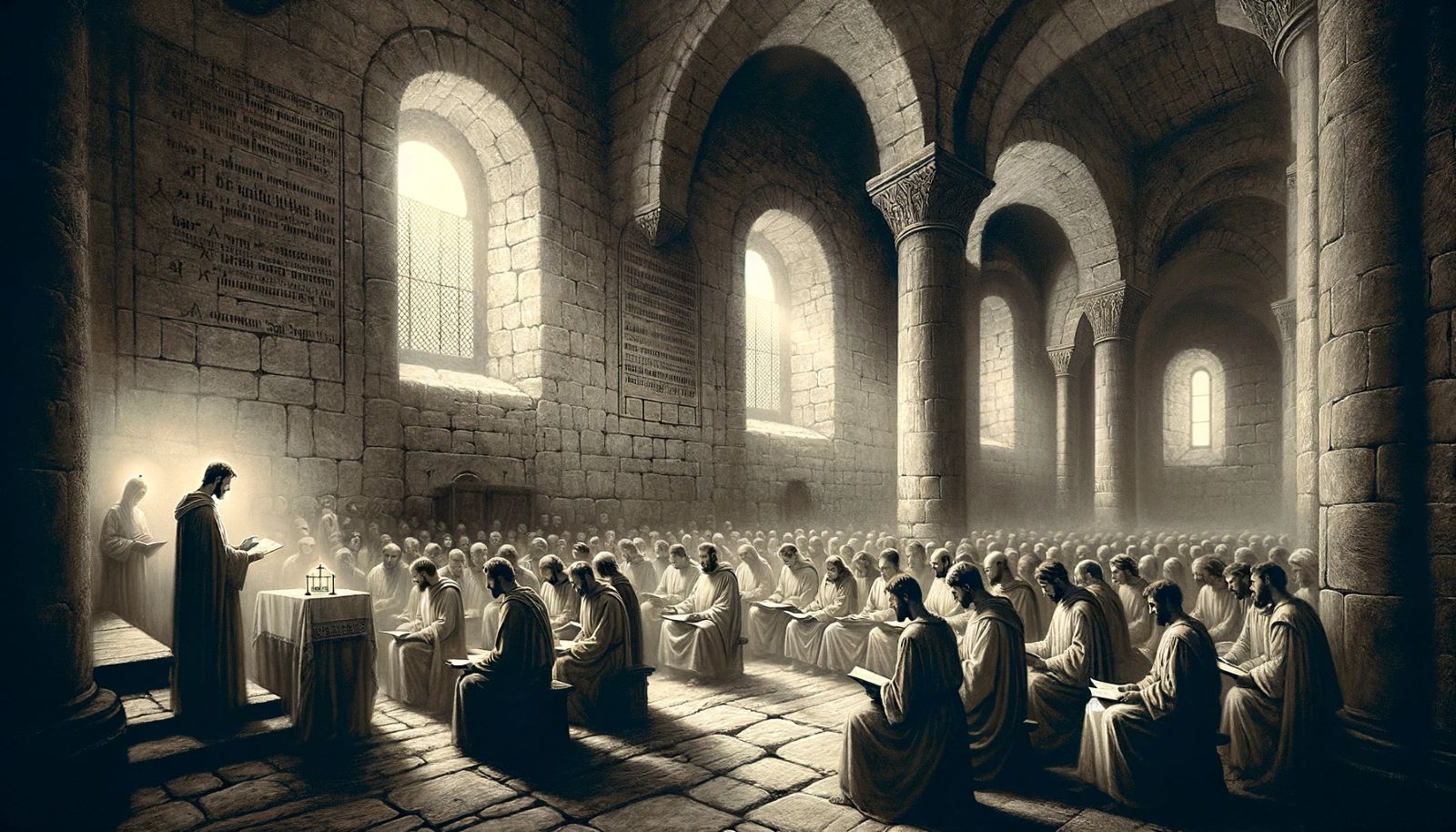Home>Bible Facts>What Religions Say The Apostles Creed


Bible Facts
What Religions Say The Apostles Creed
Published: February 18, 2024
Ericka Andersen, an editor at Christian.net, expertly merges digital strategy with content creation, focusing on faith and societal issues. Her communication skills enhance the platform's engaging narratives, fostering meaningful dialogue on belief's impact on society.
Discover what various religions say about the Apostles Creed and explore fascinating Bible facts. Uncover the beliefs and teachings across different faith traditions.
(Many of the links in this article redirect to a specific reviewed product. Your purchase of these products through affiliate links helps to generate commission for Christian.net, at no extra cost. Learn more)
Table of Contents
Introduction
The Apostles' Creed stands as a foundational statement of Christian faith, encapsulating the core beliefs shared by numerous Christian denominations. Its origins can be traced back to the early Christian church, and its significance reverberates through the centuries, uniting believers in their shared convictions. This creed serves as a testament to the enduring legacy of the apostles and their teachings, embodying the essence of Christian doctrine.
Throughout history, the Apostles' Creed has played a pivotal role in shaping the theological landscape of Christianity. Its concise yet profound declarations have provided a unifying framework for believers, transcending denominational boundaries and cultural divides. As a result, it has become a symbol of unity, affirming the fundamental tenets of the Christian faith across diverse traditions and interpretations.
The enduring relevance of the Apostles' Creed lies in its ability to articulate essential truths that resonate with Christians worldwide. Its concise yet comprehensive structure encapsulates the beliefs in the triune God, the redemptive work of Jesus Christ, the role of the Holy Spirit, the communion of saints, the forgiveness of sins, and the hope of eternal life. These foundational affirmations serve as a unifying force, fostering a sense of shared identity and purpose among believers.
As we delve into the varied interpretations of the Apostles' Creed within different Christian traditions, it becomes evident that while the core affirmations remain consistent, the nuances of emphasis and interpretation reflect the rich tapestry of Christian thought and practice. From Catholicism to Protestantism, Eastern Orthodoxy to Anglicanism, each tradition brings its distinctive perspective to the timeless truths encapsulated in the Apostles' Creed.
In the subsequent sections, we will explore how the Apostles' Creed is embraced and expounded upon within the diverse theological frameworks of Christianity, shedding light on the nuanced interpretations and emphases that characterize each tradition's understanding of this ancient confession of faith. Through this exploration, we aim to gain a deeper appreciation for the enduring significance of the Apostles' Creed and its profound impact on the beliefs and practices of Christian communities worldwide.
Read more: Why Do Presbyterians Say The Apostles Creed
Christianity and the Apostles Creed
The Apostles' Creed holds a central position within the tapestry of Christian faith, serving as a foundational statement of belief that transcends denominational distinctions. This ancient creed, with its concise yet profound affirmations, encapsulates the core tenets of Christian doctrine and has been embraced by diverse Christian traditions throughout history.
At the heart of Christianity lies the Apostles' Creed, a testament to the enduring legacy of the apostles and their teachings. This creed articulates the fundamental beliefs in the triune God, the redemptive work of Jesus Christ, the role of the Holy Spirit, the communion of saints, the forgiveness of sins, and the hope of eternal life. These essential affirmations form the bedrock of Christian faith, uniting believers across time and space in their shared convictions.
The Apostles' Creed serves as a unifying force, fostering a sense of shared identity and purpose among Christians worldwide. Its timeless declarations resonate with the hearts of believers, transcending cultural and linguistic barriers to affirm the foundational truths of the Christian faith. As a result, the Apostles' Creed stands as a symbol of unity, anchoring the beliefs of diverse Christian communities in a common confession of faith.
Throughout the centuries, the Apostles' Creed has provided a framework for Christian worship, education, and theological reflection. Its succinct yet comprehensive structure has enabled believers to articulate and affirm their faith with clarity and conviction. Moreover, the creed has served as a touchstone for Christian orthodoxy, safeguarding the essential doctrines of the faith from distortion and deviation.
In essence, the Apostles' Creed embodies the essence of Christian belief, encapsulating the core convictions that have sustained the faith of countless generations. Its enduring relevance and universal appeal underscore its significance as a unifying force within the diverse tapestry of Christian traditions, affirming the timeless truths that bind believers together in their shared journey of faith.
As we explore the varied interpretations of the Apostles' Creed within different Christian traditions, we gain a deeper appreciation for its profound impact on the beliefs and practices of Christian communities worldwide. This ancient confession of faith continues to inspire and unite believers, transcending denominational boundaries to affirm the enduring truths that define the Christian faith.
Catholicism and the Apostles Creed
Catholicism holds the Apostles' Creed in high esteem, considering it a foundational statement of faith that encapsulates essential Christian beliefs. The creed's origins can be traced back to the early centuries of Christianity, and its significance within Catholic theology is profound. The Apostles' Creed is recited as part of the Catholic liturgy, serving as a unifying confession of faith for believers worldwide.
Within the Catholic tradition, the Apostles' Creed is regarded as a succinct yet comprehensive summary of the core doctrines of the faith. It affirms belief in the triune God—Father, Son, and Holy Spirit—and acknowledges the central role of Jesus Christ in the redemption of humanity. The creed also emphasizes the communion of saints, the forgiveness of sins, the resurrection of the body, and the life everlasting, providing a holistic framework for understanding the Christian hope and the ultimate destiny of believers.
In Catholic catechesis and theological education, the Apostles' Creed occupies a central place, serving as a foundational teaching tool for instructing believers in the essential tenets of the faith. Its concise yet profound affirmations provide a framework for understanding the mysteries of the Christian faith and serve as a guide for spiritual formation and discipleship.
Moreover, the Apostles' Creed is deeply integrated into the sacramental life of the Catholic Church, finding expression in the celebration of the Eucharist, baptism, and other liturgical rites. Its recitation during the Mass reaffirms the communal confession of faith, uniting the faithful in their shared beliefs and fostering a sense of unity and continuity with the early Christian church.
In the Catholic tradition, the Apostles' Creed stands as a testament to the continuity of faith across generations, linking contemporary believers to the apostolic witness and the early Christian community. Its enduring relevance and universal appeal underscore its significance as a unifying force within the diverse tapestry of Christian traditions, affirming the timeless truths that bind believers together in their shared journey of faith.
The Apostles' Creed continues to inspire and unite Catholic believers, serving as a timeless expression of the foundational beliefs that define the Catholic faith. Its enduring significance within Catholicism reflects the profound impact of this ancient confession of faith on the beliefs and practices of Catholic communities worldwide.
Protestantism and the Apostles Creed
Protestantism, with its diverse theological traditions and denominational expressions, holds the Apostles' Creed in high regard as a foundational statement of Christian faith. The creed's ancient origins and its concise yet profound affirmations resonate deeply within Protestant theology, serving as a unifying confession of faith across denominational boundaries.
Within Protestantism, the Apostles' Creed is embraced as a testament to the enduring legacy of the apostles and their teachings. It articulates essential beliefs in the triune God, the redemptive work of Jesus Christ, the role of the Holy Spirit, the communion of saints, the forgiveness of sins, and the hope of eternal life. These core affirmations provide a unifying framework that transcends theological diversity, anchoring Protestant believers in their shared convictions.
The Apostles' Creed holds a central place in Protestant worship, education, and theological reflection. Its timeless declarations serve as a touchstone for articulating and affirming the foundational truths of the Christian faith. Moreover, the creed's succinct yet comprehensive structure has enabled Protestant communities to uphold the essential doctrines of the faith and to pass on their rich theological heritage to successive generations.
In Protestant catechesis and discipleship, the Apostles' Creed serves as a vital tool for instructing believers in the core doctrines of the faith. Its concise yet profound affirmations provide a framework for understanding the mysteries of Christian belief and serve as a guide for spiritual formation and theological reflection. The creed's enduring relevance within Protestantism underscores its significance as a unifying force, fostering a sense of shared identity and purpose among believers.
The Apostles' Creed continues to inspire and unite Protestant believers, transcending denominational distinctions to affirm the enduring truths that define the Christian faith. Its profound impact on the beliefs and practices of Protestant communities worldwide reflects its enduring significance as a unifying confession of faith within the diverse tapestry of Protestant traditions.
Eastern Orthodoxy and the Apostles Creed
Within Eastern Orthodoxy, the Apostles' Creed holds a position of profound significance, serving as a timeless expression of the core beliefs that unite Orthodox Christians across diverse cultural and geographical contexts. The creed's ancient origins and its concise yet profound affirmations resonate deeply within the theological framework of Eastern Orthodoxy, embodying the enduring legacy of the apostles and their teachings.
The Apostles' Creed articulates essential beliefs in the triune God—Father, Son, and Holy Spirit—and affirms the redemptive work of Jesus Christ, the communion of saints, the forgiveness of sins, and the hope of eternal life. These foundational affirmations provide a unifying framework that transcends cultural and linguistic barriers, anchoring Eastern Orthodox believers in their shared convictions and fostering a sense of communal identity and continuity with the early Christian church.
In the liturgical and sacramental life of the Eastern Orthodox Church, the Apostles' Creed finds expression in the celebration of the Divine Liturgy, baptism, and other sacred rites. Its recitation serves as a communal confession of faith, uniting the faithful in their shared beliefs and underscoring the continuity of Orthodox faith across generations. Moreover, the creed's enduring relevance within Eastern Orthodoxy reflects its significance as a unifying force, fostering a sense of shared identity and purpose among believers.
The Apostles' Creed also plays a pivotal role in Orthodox catechesis and theological education, serving as a foundational teaching tool for instructing believers in the essential doctrines of the faith. Its concise yet profound affirmations provide a framework for understanding the mysteries of Christian belief and serve as a guide for spiritual formation and discipleship within the Eastern Orthodox tradition.
In essence, the Apostles' Creed continues to inspire and unite Eastern Orthodox believers, serving as a timeless expression of the foundational beliefs that define the Orthodox faith. Its enduring significance within Eastern Orthodoxy reflects the profound impact of this ancient confession of faith on the beliefs and practices of Orthodox communities worldwide, affirming the timeless truths that bind believers together in their shared journey of faith.
Read more: What Are The Words Of The Apostles Creed
Anglicanism and the Apostles Creed
Anglicanism, with its rich theological heritage and diverse expressions, holds the Apostles' Creed in high esteem as a foundational statement of Christian faith. The creed's ancient origins and its concise yet profound affirmations resonate deeply within Anglican theology, serving as a unifying confession of faith across the global Anglican Communion.
Within Anglicanism, the Apostles' Creed is embraced as a testament to the enduring legacy of the apostles and their teachings. It articulates essential beliefs in the triune God, the redemptive work of Jesus Christ, the role of the Holy Spirit, the communion of saints, the forgiveness of sins, and the hope of eternal life. These core affirmations provide a unifying framework that transcends theological diversity, anchoring Anglican believers in their shared convictions.
The Apostles' Creed holds a central place in Anglican worship, education, and theological reflection. Its timeless declarations serve as a touchstone for articulating and affirming the foundational truths of the Christian faith. Moreover, the creed's succinct yet comprehensive structure has enabled Anglican communities to uphold the essential doctrines of the faith and to pass on their rich theological heritage to successive generations.
In Anglican catechesis and discipleship, the Apostles' Creed serves as a vital tool for instructing believers in the core doctrines of the faith. Its concise yet profound affirmations provide a framework for understanding the mysteries of Christian belief and serve as a guide for spiritual formation and theological reflection. The creed's enduring relevance within Anglicanism underscores its significance as a unifying force, fostering a sense of shared identity and purpose among believers.
The Apostles' Creed continues to inspire and unite Anglican believers, transcending denominational distinctions to affirm the enduring truths that define the Christian faith. Its profound impact on the beliefs and practices of Anglican communities worldwide reflects its enduring significance as a unifying confession of faith within the diverse tapestry of Anglican traditions.
In essence, the Apostles' Creed stands as a timeless expression of the foundational beliefs that define Anglican faith, serving as a unifying force that fosters a sense of communal identity and continuity with the early Christian church. Its enduring relevance within Anglicanism underscores its profound impact on the beliefs and practices of Anglican communities worldwide, affirming the timeless truths that bind believers together in their shared journey of faith.
Conclusion
The Apostles' Creed stands as a timeless testament to the enduring legacy of the apostles and their teachings, embodying the essence of Christian doctrine. Across diverse Christian traditions, from Catholicism to Protestantism, Eastern Orthodoxy to Anglicanism, this ancient confession of faith serves as a unifying force, affirming the fundamental tenets of the Christian faith. Its concise yet profound affirmations provide a framework for understanding the mysteries of Christian belief and serve as a guide for spiritual formation and theological reflection.
The enduring relevance of the Apostles' Creed lies in its ability to articulate essential truths that resonate with Christians worldwide. Its concise yet comprehensive structure encapsulates the beliefs in the triune God, the redemptive work of Jesus Christ, the role of the Holy Spirit, the communion of saints, the forgiveness of sins, and the hope of eternal life. These foundational affirmations serve as a unifying force, fostering a sense of shared identity and purpose among believers.
As we have explored the varied interpretations of the Apostles' Creed within different Christian traditions, it becomes evident that while the core affirmations remain consistent, the nuances of emphasis and interpretation reflect the rich tapestry of Christian thought and practice. The creed's enduring significance within Catholicism, Protestantism, Eastern Orthodoxy, and Anglicanism reflects its profound impact on the beliefs and practices of Christian communities worldwide.
In essence, the Apostles' Creed continues to inspire and unite believers, transcending denominational boundaries to affirm the enduring truths that define the Christian faith. Its profound impact on the beliefs and practices of Christian communities worldwide underscores its enduring significance as a unifying confession of faith within the diverse tapestry of Christian traditions. As we reflect on the enduring legacy of the Apostles' Creed, we are reminded of its timeless relevance and universal appeal, affirming the foundational truths that bind believers together in their shared journey of faith.














